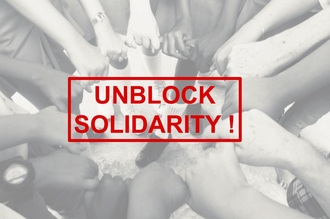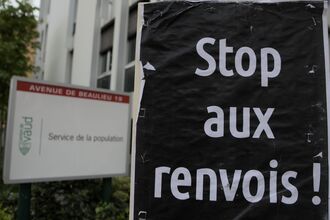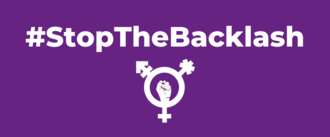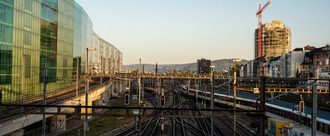- Alle
- Arbeit
- Bildung
- Bürger- und Menschenrechte
- Datenschutz
- Demokratie
- Digitalisierung
- Energie
- Europa
- Familie
- Finanzen
- Flucht und Asyl
- Freizeit
- Frieden
- Gender
- Gesundheit
- Gleichstellung
- Internationale Gerechtigkeit
- Kinder- und Jugendschutz
- Klima
- Konsumentenschutz
- Kultur
- Landwirtschaft
- LGBTQI+
- Medien
- Rassismus
- Rechtsextremismus
- Soziales
- Sport
- Stadtentwicklung/öffentlicher Raum
- Tierschutz
- Umwelt
- Verkehr
- Whistleblowing
- Wirtschaft
- Wohnen
- Mehr
-
UNBLOCK SOLIDARITY: Stop agli ostacoli delle banche svizzereEmergenza umanitaria? Per aiutare, bisogna prima mostrare le proprie credenziali! Quando una regione e la sua popolazione si trovano ad affrontare disastri, come il recente terremoto in Turchia e Siria, le organizzazioni umanitarie devono essere in grado di agire rapidamente e senza ostacoli amministrativi. Ma la tecnologia, che dovrebbe rendere le cose più facili, è quella che si mette di traverso. Il sistema di messaggistica bancaria SWIFT, ad esempio, può bloccare qualsiasi transazione finché compare uno dei termini appartenenti alla "lista nera", indipendentemente dalle vite umane in gioco. Le banche sostengono di non poter effettuare trasferimenti verso Paesi sottoposti a embargo o sanzioni economiche. In effetti, l'UE, gli Stati Uniti e il Consiglio di Sicurezza delle Nazioni Unite utilizzano le sanzioni economiche per "combattere una minaccia alla pace e alla sicurezza internazionale". Compiacenza delle banche Sebbene l'aiuto umanitario e allo sviluppo sia legalmente esente da sanzioni economiche, le associazioni svizzere da anni sono ostacolate nell'invio di fondi. In obbedienza anticipata verso i grandi poteri economici, banche come UBS, Cler Bank, e ora anche banche cantonali e PostFinance, rifiutano di effettuare transazioni o richiedono una complessa dichiarazione per i pagamenti. Questo blocco si applica anche ai piccoli trasferimenti che non sono destinati all'estero, ma da un conto privato svizzero a un altro conto bancario svizzero. Ad esempio, gli ordini di pagamento interni possono essere rifiutati non appena la parola "Cuba", "Iran", "Iraq", "Kurdistan" o "Siria" compare nel sistema. Senza nemmeno inviare fondi in questi Paesi! Questa petizione è stata lanciata da diverse associazioni di aiuto allo sviluppo o di aiuto umanitario preoccupate dalle difficoltà di trasferimento dei fondi in Svizzera: Centrale Sanitaire Suisse Romande, mediCuba-Suisse, Association de Solidarité Nicaragua-El Salvador Genève, Associazione per l'Aiuto Medico al Centro America (AMCA), medico international schweiz, l’Associazione Svizzera-Cuba (sezione di Zurigo) e Mezzaluna Rossa del Kurdistan Svizzera.76 von 100 UnterschriftenGestartet von Coalition Stop aux entraves des banques suisses
-
UNBLOCK SOLIDARITY: Stoppt die Blockade durch Schweizer BankenImmer wieder wird dringende, solidarische Hilfe verhindert - Das darf nicht sein! Wenn eine Region und ihre Bevölkerung von Katastrophen heimgesucht werden, wie jüngst die Türkei und Syrien von den verheerenden Erdbeben, müssen Hilfsorganisationen schnell und ohne bürokratische Hürden handeln können. Moderne Kommunikationsmittel und elektronische Zahlungssysteme helfen dabei. Gleichzeitig können moderne Technologien der Hilfe jedoch auch Steine in den Weg legen. Das Banknachrichtensystem SWIFT beispielsweise kann jegliche Transaktionen blockieren, sobald ein Begriff verwendet wird, der auf einer sogenannten "schwarzen Liste" auftaucht. Das Argument der Bankinstitute ist, dass sie keine Überweisungen in Länder tätigen können, die unter Embargo oder Wirtschaftssanktionen stehen. Die Europäische Union, die USA und der Sicherheitsrat der Vereinten Nationen verhängen Wirtschaftssanktionen, um "eine Bedrohung des Weltfriedens und der internationalen Sicherheit zu bekämpfen". In der Realität erschweren die Sanktionen jedoch oft die Durchführung von Geldüberweisungen in Teilen der Welt, die besonders stark von humanitären Krisen betroffenen sind und schaden insbesondere der Zivilbevölkerung. Wem sind die Banken hörig? Die humanitäre Hilfe und die Entwicklungshilfe sind rechtlich von Wirtschaftssanktionen ausgenommen. Dennoch werden Schweizer NGOs und solidarische Vereine seit einigen Jahren bei Geldüberweisungen mehr und mehr behindert. In vorauseilendem Gehorsam gegenüber wirtschaftlichen Grossmächten verweigern Banken wie die UBS oder die Bank Cler und sogar Kantonalbanken und die PostFinance Transaktionen oder verlangen eine aufwendige Selbstdeklaration für die Zahlungen. Besonders beunruhigend: Sogar kleine Überweisungen von einem Schweizer Privatkonto auf ein anderes Schweizer Bankkonto werden immer wieder blockiert. Innerschweizerische Zahlungsaufträge werden zum Beispiel abgelehnt, sobald die Wörter "Kuba", "Kurdistan", "Syrien" oder "Irak" im System auftauchen – und das ohne, das überhaupt Geld in diese Länder verschickt werden soll! Diese Petition wird von verschiedenen Organisationen im Bereich der Entwicklungszusammenarbeit und der humanitären Hilfe lanciert. In ihrer Arbeit sind sie direkt betroffen von verweigerten Geldüberweisungen – sogar innerhalb der Schweiz: Centrale Sanitaire Suisse Romande, mediCuba-Suisse, medico international schweiz, Associazione per l'Aiuto Medico al Centro America (AMCA), Association de solidarité Nicaragua-El Salvador Genève, Vereinigung Schweiz Cuba und der Heyva Sor a Kurdistane - Schweiz.145 von 200 UnterschriftenGestartet von Coalition Stop aux entraves des banques suisses
-
Abolire l'obbligo di ottenere il passaporto per gli/le eritrei/e in SvizzeraGli/Le eritrei/e senza status di rifugiato/a che, ad esempio, vogliono sposarsi o cambiare un permesso di ammissione temporaneo F in un permesso di soggiorno B, devono presentare un passaporto alle autorità svizzere. Per farlo, devono contattare il regime dittatoriale del loro Paese d'origine. Si tratta di un requisito irragionevole. In Germania, il più alto tribunale amministrativo ha stabilito che la cosiddetta "dichiarazione di rimorso" è irragionevole. Da allora, le autorità tedesche hanno rinunciato al requisito del passaporto per gli/le eritrei/e (vedi https://www.bverwg.de/pm/2022/62). Nessuno/a può essere costretto a incriminarsi.31 von 100 UnterschriftenGestartet von Migrant Solidarity Network
-
Pour l'arrêt immédiat des renvois forcés de femmes, enfants et personnes vulnérablesLe 2 mai dernier deux familles frappées d’une décision Non-Entrée en Matière (NEM) ont été renvoyées du canton de Vaud vers la Croatie dans des conditions inhumaines. Ces renvois qui traumatisent des enfants et qui sont d’une violence indicible pour toute personne au parcours migratoire déjà éprouvant, doivent cesser. Enfants blessés et arrachés à leurs parents : une ligne rouge a été franchie Lors de ces deux renvois, la police a arraché les enfants aux parents pour les forcer à coopérer. Trois enfants scolarisés ont été enlevés brutalement de leur quotidien qui se stabilisait enfin. Un de ces trois enfants est couvert de griffures à la suite de l’intervention de la police. Une femme seule avec son bébé de 18 mois a été renvoyée dans le pays où elle a subi des violences. Une ligne a dès lors été franchie par les autorités vaudoises : elles n’hésitent pas à employer des méthodes violentes sur des parents et des enfants. Les pratiques violentes se multiplient et s’intensifient dans les procédures de renvois ; au cours des derniers mois, nous avons été témoins de nombreux traitements inhumains (violences psychologiques et physiques) infligés par les politiques migratoires ainsi que par la police lors des arrestations en vue de renvois. Tout cela pour quoi ? Pour renvoyer des personnes qui ont déjà dû faire preuve de courage et de persévérance extraordinaire durant leur parcours migratoire. Des centaines de familles, de femmes seules et de personnes vulnérables sont menacées d’un renvoi Dublin dans le canton de Vaud. Les accords Dublin permettent aux autorités de renvoyer des réfugié-es vers le premier pays européen où ils et elles ont été enregistré-es - mais pas forcément où une demande d’asile a été déposée. La Suisse n’examine même pas les raisons de leur fuite. Les personnes renvoyées à cause des accords Dublin n’ont ainsi jamais pu demander formellement l’asile en Suisse. Il est impératif de réagir vite et avec force pour montrer aux autorités vaudoises notre colère et indignation collective face à ces pratiques.2.077 von 3.000 UnterschriftenGestartet von Collectif Droit de rester, Lausanne
-
Interdiction d’utiliser des balles en caoutchoucL’utilisation de balles en caoutchouc est toujours dangereuse et est souvent associée à des situations de répression et de violence arbitraire de la part de la police. Bien que les munitions aient été conçues pour réduire le risque qu’une personne soit gravement blessée, elles provoquent en réalité des blessures graves ou des lésions. Dr Anna Fierz l’exprime au nom de nombreux•se•x•s ophtalmologistes : « Les balles en caoutchoucs utilisées dans ce pays présentent une dispersion considérable, c’est pourquoi il n’est pas possible d’éviter de manière fiable les blessures aux yeux. » Malgré cela, elles sont toujours utilisées en Suisse et causent de graves dommages. En outre, selon Dr Fierz, les données sur les blessures oculaires causées par des balles en caoutchouc ne sont pas publiées, ce qui signifie qu’il y a un grand nombre de cas non déclarés. De nombreux pays européens ont déjà pris des mesures contre l’utilisation de ce type de munitions, prouvant ainsi qu’il est possible de maintenir l’ordre public sans l’utilisation de telles armes. Pourquoi n’en est-il pas de même en Suisse ? Quelle est la fonction réelle et le but de l’utilisation de balles en caoutchouc ? Si l’objectif est de disperser et de faire fuir la foule, pourquoi tirer arbitrairement à hauteur des yeux sur un groupe de personnes encerclées ? La dissolution de manifestations non autorisées ne justifie pas l’utilisation de munitions qui causent des dommages permanents tels que la perte de la vue. Il est grand temps que la Suisse édicte elle aussi une interdiction de l’utilisation de balles en caoutchouc et que l’État s’engage à créer un climat dans lequel les droits humains et la sécurité des citoyen•ne•x•s soient mieux pris en compte. (Blessures d'une femme par des balles en caoutchouc le 8 mars à Bâle) https://uploads-campax.s3.eu-central-1.amazonaws.com/Verletzungen-Gummigeschosse-Basel-8.3.23.png ***** Sources: - https://www.tagesanzeiger.ch/demonstrant-verliert-auge-wegen-gummigeschoss-141148247076 - https://www.republik.ch/2022/12/01/voll-ins-auge - https://saez.ch/article/doi/saez.2022.20611 - Image: Mark Hull, https://www.flickr.com/ photos/hully_exile/2459531253324 von 400 UnterschriftenGestartet von Campax - make change happen

-
Assez de journalisme à sensation mensonger !Les articles de presse sexistes et sans fondement ne sont pas nouveaux. On trouve également des articles sur l'étude dans les médias de Suisse romande, soutenus et alimentés par l'article de la Sonntagszeitung. Le débat sur l'égalité est mené de manière unilatérale dans les médias et est encore une fois traîné dans la boue juste avant le 14 juin, sur la base de contre-vérités. C'est pourquoi la qualité du journalisme doit être préservée, même pour les médias romands ! Vous trouverez ici notre plainte adressée au Conseil de la presse (en allemand) : https://uploads-campax.s3.eu-central-1.amazonaws.com/20230510_Beschwerde%20Presserat%20%281%29-1.png https://uploads-campax.s3.eu-central-1.amazonaws.com/20230510_Beschwerde%20Presserat%20%281%29-2.png https://uploads-campax.s3.eu-central-1.amazonaws.com/20230510_Beschwerde%20Presserat%20%281%29-3.png https://uploads-campax.s3.eu-central-1.amazonaws.com/20230510_Beschwerde%20Presserat%20%281%29-4.png La traduction de la plainte: Chers membres du Conseil de la presse Je dépose une plainte contre l'article "Umfrage an der ETH und Uni Zürich : Die meisten Studentinnen willst lieber einen erfolgreichen Mann als selber Karriere machen" de Rico Bandle, paru le 6 mai 2023 dans la Sonntagszeitung. L'article viole la directive 1.1 (recherche de la vérité). Exemple 1 : Le titre "La plupart des étudiantes préfèrent avoir un homme qui réussit plutôt que de faire carrière elles-mêmes" ne peut pas être déduit de l'étude en question comme une conclusion causale. Certes, 23% (dans les disciplines "féminines") et 28% (dans les disciplines "masculines") des étudiantes déclarent vouloir occuper un poste de direction avec des responsabilités en matière de personnel, tandis que 45% (dans les disciplines "féminines") et 32% (dans les disciplines "masculines") recherchent un partenaire avec des chances et des perspectives de carrière plus élevées. L'intersection de ces deux groupes n'a pas été calculée dans l'étude et ne peut pas représenter mathématiquement la majorité des étudiantes. De même, le titre suggère que le manque d'intérêt pour les postes de direction est corrélé au sexe, alors que l'étude montre que les postes de direction ne sont pas appréciés par la majorité des étudiants, indépendamment du sexe. Exemple 2 : "La principale raison de la direction au compte-gouttes (le fait empiriquement constaté que les femmes sont sous-représentées dans les postes supérieurs, ndlr) n'est pas la discrimination ou des conditions plus difficiles pour les mères, comme on le dit souvent, mais le fait que de nombreuses étudiantes n'ont pas ou peu d'ambitions de carrière". Ce que dit l'étude : 23% de toutes les femmes interrogées dans des "disciplines féminines" et 28% dans des "disciplines masculines" aspirent à un "poste de direction avec des responsabilités en matière de ressources humaines". Mais ce chiffre est également relativement bas chez les hommes, où 25% (dans les "matières féminines") et 35% (dans les "matières masculines") aspirent à un "poste de direction avec responsabilité de personnel". La différence entre les sexes est faible. (Annexe, Fig. 5) Une fois de plus, il est suggéré ici que les ambitions de carrière déduites de la présente étude ont un lien avec le sexe. Cela ne correspond pas à la vérité. Exemple 3 : "Leur (les femmes interrogées, ndlr) vision de la famille reste plutôt conservatrice : elles ont tendance à préférer un partenaire plus âgé et plus performant qu'elles". Ce que dit l'étude : 45% de toutes les femmes interrogées dans des "disciplines féminines" et 32% dans des "disciplines masculines" souhaitent avoir des partenaires* avec de meilleures perspectives de carrière. (Annexe, Fig. 8) Cela signifie qu'une nette majorité de femmes - 55% des femmes interrogées dans les "disciplines féminines" et 68% dans les "disciplines masculines" - souhaitent un partenaire qui a des perspectives de carrière aussi bonnes ou moins bonnes. En ne mentionnant pas qu'une majorité des deux sexes souhaitent un* partenaire avec des perspectives de carrière égales ou inférieures, on donne une image fausse et déséquilibrée. Exemple 4 : "Quand il y a des enfants, elles (les femmes interrogées, ndlr) veulent travailler à temps partiel, l'homme doit assurer le revenu principal à plein temps". Ce que dit l'étude : une nette minorité - 22% des répondantes dans les "matières féminines" et 34% dans les "matières masculines" - souhaitent que leur partenaire travaille à plein temps après avoir fondé une famille. Les valeurs comparatives pour les hommes : 16% des hommes dans les "matières féminines" (soit seulement 6% de moins que les femmes) et 27% dans les "matières masculines" (7% de moins) souhaitent un partenaire qui travaille à plein temps après avoir fondé une famille. (voir statistique 3, annexe) L'article donne l'image d'une majorité de femmes interrogées souhaitant un homme travaillant à plein temps. En réalité, il s'agit d'une minorité et l'affirmation de l'article est fausse. Je n'ai pas l'intention d'intenter une action en justice contre ce média.462 von 500 UnterschriftenGestartet von Campax - make change happen

-
Basta con il giornalismo sensazionalista e falso!Gli articoli sessisti e infondati dei media non sono una novità. Articoli sullo studio si trovano anche nei media di lingua italiana, sostenuti e alimentati dall'articolo della Sonntagszeitung. Il dibattito sull'uguaglianza di genere è condotto in modo unilaterale dai media e viene trascinato nel fango ancora una volta poco prima del 14 giugno, sulla base di falsità. Ecco perché vale anche per i media in lingua italiana: il giornalismo di qualità deve essere preservato! Qui può trovare il nostro reclamo al Consiglio svizzero della Stampa (in tedesco): https://uploads-campax.s3.eu-central-1.amazonaws.com/20230510_Beschwerde%20Presserat%20%281%29-1.png https://uploads-campax.s3.eu-central-1.amazonaws.com/20230510_Beschwerde%20Presserat%20%281%29-2.png https://uploads-campax.s3.eu-central-1.amazonaws.com/20230510_Beschwerde%20Presserat%20%281%29-3.png https://uploads-campax.s3.eu-central-1.amazonaws.com/20230510_Beschwerde%20Presserat%20%281%29-4.png56 von 100 UnterschriftenGestartet von Campax - make change happen

-
Divieto dell'uso di proiettili di gommaL'uso di proiettili di gomma è sempre pericoloso ed è spesso associato a situazioni di repressione e violenza ingiustificata da parte delle forze dell’ordine. Sebbene tali munizioni siano state concepite per minimizzare il rischio di lesioni gravi, i proiettili di gomma invece causano spesso danni irreversibili.. A nome di molti/e oculisti/e, la dottoressa Anna Fierz afferma che: "I proiettili di gomma utilizzati in questo Paese hanno una notevole dispersione, motivo per cui non è possibile prevenire in modo affidabile le lesioni agli occhi". Tuttavia, tali munizioni vengono ancora utilizzate in Svizzera con gravi conseguenze. Inoltre, secondo la dottoressa Fierz, i dati sulle lesioni oculari causate dai proiettili di gomma non vengono pubblicati, per cui esiste un elevato numero di casi non segnalati. Molti Paesi europei hanno già adottato misure contro l'uso di questo tipo di munizioni, dimostrando che è possibile mantenere l'ordine pubblico senza l'uso di tali armi. Perché non è così anche in Svizzera? Qual è la funzione e lo scopo effettivo dell'uso di proiettili di gomma? Se l'obiettivo è quello di disperdere la folla, perché i proiettili di gomma vengono sparati indiscriminatamente all'altezza degli occhi su un gruppo di persone accerchiate? Disperdere manifestazioni non autorizzate non giustifica l'uso di munizioni che possono causare danni irreversibili come la perdita della vista. È giunto il momento che anche la Svizzera vieti l'uso di proiettili di gomma e che lo Stato si impegni a creare un clima in cui i diritti umani e la sicurezza dei cittadini e delle cittadine siano considerati una priorità. (Ferite di una donna causate da proiettili di gomma l'8 marzo a Basilea) https://uploads-campax.s3.eu-central-1.amazonaws.com/Verletzungen-Gummigeschosse-Basel-8.3.23.png ***** Fonti: - https://www.tagesanzeiger.ch/demonstrant-verliert-auge-wegen-gummigeschoss-141148247076 - https://www.republik.ch/2022/12/01/voll-ins-auge - https://saez.ch/article/doi/saez.2022.20611 - Immagine: Mark Hull, https://www.flickr.com/ photos/hully_exile/2459531253124 von 200 UnterschriftenGestartet von Campax - make change happen

-
Genug von unwahrem Sensationsjournalismus!Dieser Fall ist nicht der erste von sexistischer, sensationsheischender Berichterstattung. Aber jetzt ist es genug! Hier die Detaillierten Ausführungen dazu, warum der Artikel den Richtlinien des Presserates widerspricht: Der Artikel verletzt die Richtlinie 1.1 (Wahrheitssuche). Beispiel 1: Der Titel «Die meisten Studentinnen wollen lieber einen erfolgreichen Mann, als selber Karriere machen» kann so kausal nicht als Schlussfolgerung aus der betreffenden Studie abgeleitet werden. Zwar geben 23% (in «Frauenfächern») bzw. 28% (in «Männerfächern») der Studentinnen an eine Führungsposition mit Personalverantwortung anzustreben, während 45% (in «Frauenfächern») bzw. 32% (in «Männerfächern») einen Partner mit höheren Karrierechancen und - aussichten suchen. Die Schnittmenge dieser beiden Gruppen ist in der Studie nicht berechnet worden und kann rechnerisch nicht die Mehrheit der Studentinnen abbilden. Ebenfalls wird mit dem Titel suggeriert, dass fehlendes Interesse an Führungspositionen mit dem Geschlecht korreliert, während die Studie aufzeigt, dass Führungspositionen beim Grossteil der Studierenden unbeliebt sind, unabhängig vom Geschlecht. Beispiel 2: «Der wichtigste Grund für die tröpfelnde Leitung (die empirisch feststellbare Tatsache, dass Frauen in höheren Positionen untervertreten sind, Anm. d. Verf.) sind nicht etwa Diskriminierung oder erschwerte Bedingungen für Mütter, wie oft gesagt wird, sondern dass viele Studentinnen keine oder nur geringe Karriereambitionen haben.» Was die Studie sagt: 23% aller weiblichen Befragten in «Frauenfächern» und 28% in «Männerfächern» streben eine «Führungsposition mit Personalverantwortung» an. Die Zahl ist bei Männern aber auch verhältnismässig tief, dort streben 25% (in «Frauenfächern») und 35% (in «Männerfächern») eine «Führungsposition mit Personalverantwortung» an. Der Geschlechterunterschied ist gering. (siehe Statistik 1, Anhang) Erneut wird hier suggeriert, dass die Karriereambitionen abgeleitet aus der vorliegenden Studie einen Bezug zum Geschlecht haben. Dies entspricht nicht der Wahrheit. Beispiel 3: «Ihr (die weiblichen Befragten, Anm. d. Verf.) Familienbild ist nach wie vor eher konservativ geprägt: Tendenziell bevorzugen sie einen Partner, der älter und erfolgreicher ist als sie.» Was die Studie sagt: 45% aller weiblichen Befragten in «Frauenfächern» und 32% in «Männerfächern» wünschen sich Partner*innen mit besseren Karriereaussichten. (siehe Statistik 2, Anhang) Das heisst eine deutliche Frauenmehrheit – 55% der weiblichen Befragten in «Frauenfächern» und 68% in «Männerfächern» – wünscht sich einen Partner, der gleich gute oder geringere Karriereaussichten hat. Indem nicht erwähnt wird, dass sich eine Mehrheit beider Geschlechter eine*n Partner*in mit gleichen oder geringeren Karrierechancen wünscht, wird ein falsches und unausgewogenes Bild vermittelt. Beispiel 4: «Wenn Kinder da sind, wollen sie (die weiblichen Befragten, Anm. d. Verf.) Teilzeit arbeiten, der Mann soll Vollzeit für das Haupteinkommen sorgen.» Was die Studie sagt: Eine klare Minderheit – 22% der weiblichen Befragten in «Frauenfächern» und 34% in «Männerfächern» – wünschen sich einen Partner, der nach der Familiengründung Vollzeit arbeitet. Die Vergleichswerte für Männer: 16% der Männer in «Frauenfächern» (also nur 6% weniger als bei den Frauen) und 27% in «Männerfächern» (7% weniger) wollen eine Partnerin, die nach der Familiengründung Vollzeit arbeitet. (siehe Statistik 3, Anhang) Im Artikel wird das Bild gezeichnet, dass eine Mehrheit der weiblichen Befragten sich einen Vollzeit arbeitenden Mann wünscht. Tatsächlich ist es eine Minderheit und die Aussage des Artikels falsch. Unsere Beschwerde an den Presserat: https://uploads-campax.s3.eu-central-1.amazonaws.com/20230510_Beschwerde%20Presserat%20%281%29-1.png https://uploads-campax.s3.eu-central-1.amazonaws.com/20230510_Beschwerde%20Presserat%20%281%29-2.png https://uploads-campax.s3.eu-central-1.amazonaws.com/20230510_Beschwerde%20Presserat%20%281%29-3.png https://uploads-campax.s3.eu-central-1.amazonaws.com/20230510_Beschwerde%20Presserat%20%281%29-4.png2.892 von 3.000 UnterschriftenGestartet von Campax - make change happen

-
Verbot des Einsatzes von GummigeschossenDer Einsatz von Gummigeschossen ist immer gefährlich und wird oft mit Situationen von Repression und willkürlicher Gewalt durch die Polizei in Verbindung gebracht. Obwohl die Munition entwickelt wurde, um das Risiko zu verringern, dass eine Person schwer verletzt wird, verursacht sie in der Realität schwere Verletzungen. Stellvertretend für viele Augenärzt*innen drückt es Dr. Anna Fierz aus: “Das hierzulande verwendete Gummischrot weist eine beträchtliche Streuung auf, weshalb es nicht möglich ist, Augenverletzungen zuverlässig zu vermeiden.” Schon auf 10 Meter streut das Schrot aus dem Mehrzweckwerfer über eine Fläche von 2x2m. Trotzdem werden Gummigeschosse in der Schweiz immer noch verwendet und verursachen schwerwiegende Schäden. Ausserdem, werden die Daten über Augenverletzungen durch Gummigeschosse nicht veröffentlicht, so dass es eine Dunkelziffer gibt. Viele europäische Länder haben bereits Massnahmen gegen den Einsatz dieser Art von Munition ergriffen und damit bewiesen, dass es möglich ist, die öffentliche Ordnung ohne den Einsatz solcher Waffengewalt aufrechtzuerhalten. Warum ist dies nicht auch in der Schweiz der Fall? Was ist die eigentliche Funktion und der Zweck des Einsatzes von Gummigeschossen? Wenn das Ziel darin besteht, die Menge zu zerstreuen und zu vertreiben, warum wird dann willkürlich in eine eingekesselte Gruppe von Menschen geschossen? Die Auflösung nicht bewilligter Demonstrationen rechtfertigt nicht den Einsatz von Munition, die bleibende Schäden wie den Verlust des Augenlichts verursachen. Es ist höchste Zeit, dass auch die Schweiz ein Verbot des Einsatzes von Gummigeschossen erlässt und sich der Staat verpflichtet, ein Klima zu schaffen, in dem die Menschenrechte und die Sicherheit der Bürger*innen besser berücksichtigt werden. (Verletzungen bei einer Frau durch Gummigeschosse am 8. März in Basel) https://uploads-campax.s3.eu-central-1.amazonaws.com/Verletzungen-Gummigeschosse-Basel-8.3.23.png ***** Quellen: - https://www.tagesanzeiger.ch/demonstrant-verliert-auge-wegen-gummigeschoss-141148247076 - https://www.republik.ch/2022/12/01/voll-ins-auge - https://saez.ch/article/doi/saez.2022.20611 - Bild: Mark Hull, https://www.flickr.com/ photos/hully_exile/24595312536.471 von 7.000 UnterschriftenGestartet von Campax - make change happen

-
Bezahlbare ÖV-Preise für Studierende der FHNWEs ist wichtig, dass jungen Menschen, die eine Ausbildung absolvieren möchten, keine Steine in den Weg gelegt werden. Die FHNW wurde seinerzeit von den vier Trägerkantonen geschaffen, um die Qualität der Fachhochschule zu erhöhen und Synergien zu nutzen. Man war bereit, von den Studierenden Mobilitätbereitschaft zu fordern. Es gilt jetzt, eine Nebenwirkung der sinnvollen geografischen Konzentration der Bildungsangebote zu beseitigen. Ein konkretes Beispiel: Um von Basel an den FHNW-Standort Olten zu kommen, reicht das U-Abo nicht aus. Dieses gilt nur bis Tecknau. Für die eine Station zwischen Tecknau und Olten muss also jedes Mal ein separates Ticket oder ein teures Streckenabo gelöst werden. Für diese Strecke kostet das mit Halbtax CHF 6.80 täglich, ohne Halbtax CHF 10.00. Dasselbe gilt für andere FHNW-Standorte. Diese Mehrkosten fallen für Studierende, die oftmals über kein üppiges Budget verfügen, schwer ins Gewicht. LDP-Grossrätin Annina von Falkenstein hat dazu im Grossen Rat Basel-Stadt bereits eine Motion eingereicht: https://grosserrat.bs.ch/dokumente/100404/000000404572.pdf Verschiedene Medien haben das Thema bereits aufgegriffen: https://www.baseljetzt.ch/fhnw-studis-fordern-guenstigeres-oev-abo-fuer-olten-und-brugg/341841.286 von 2.000 UnterschriftenGestartet von Jungliberale Basel

-
Klima- und Umweltfachstelle in BelpWir haben keine Zeit mehr für grosse Debatten und müssen die Klimawende schaffen. Es ist deshalb am falschen Ort gespart, wenn die Arbeit auf dieses Ziel hin infolge Zeitmangels nicht in Angriff genommen werden kann. Es braucht genügend Leute in den Gemeindeverwaltungen, die sich vollständig der Klima- und Biodiversitäts-Thematik annehmen können. Das Legislaturziel 2024 Energiestadtlabel ist für Belp wichtig, wie es dieses für jede Gemeinde wäre. Jeder Fortschritt in Richtung Klimaverbesserung ist zu begrüssen. Münsingen (Gold), Muri-Gümligen und Köniz (Gold), um nur einzelne zu nennen, verfügen längst über das Label.203 von 300 UnterschriftenGestartet von Klima- und Umweltgruppe Belp






.png)
.png)
.png)
.png)
.png)
